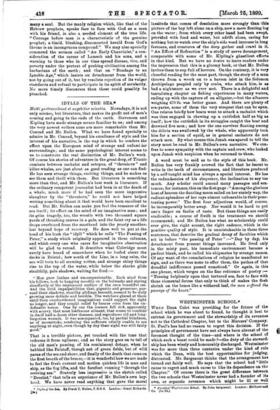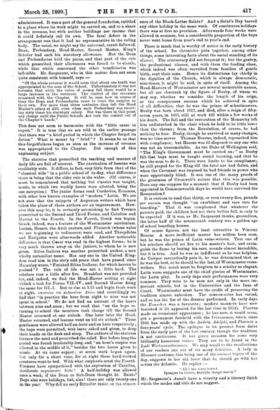WESTMINSTER SCHOOL.*
WHEN Dean Colet was providing for the future of the school which he was about to found, he thought it best to entrust its government and the stewardship of its revenues not to the Cathedral Chapter, but to the Mercers' Company. St. Paul's has had no reason to regret this decision. If the principles of government have not always been abreast of the foremost thought of the time—and where is the school of which such a boast could be made ?—the duty of the steward- ship has been wisely and honourably discharged. Westminster was for more than three centuries under the kind of rule which the Dean, with the best opportunities for judging, distrusted. Mr. Sargeaunt thinks that the arrangement has turned out fairly well. He says that the school had "little cause to regret and much cause to like its dependence on the Chapter." Of course there is the great difference between the two schools that Westminster never had a founder of its own, or separate revenues which might be ill or well • Annolsof Westminster School. By Tohn Bargeaant. London : Methuen ao.4 Co. re. 6d.)
- administered. It was a part of the general foundation, entitled to a place where. its work might be carried on, and to a share in the revenue, but with neither buildings nor income that it could definitely call its own. The fatal defect in the arrangement was that it had no representative in the ruling body. The usual, we might say the universal, result followed. Dean, Prebendary, Head-Master, Second Master, King's Scholar had each his statutory allowance. But the Dean and Prebendaries held the purse, and that part of the rule which prescribed their allowances was found to be elastic, while that which concerned the other beneficiaries was inflexible. Mr. Sargeaunt; who in this matter does not seem quite consistent with himself, says :—
"Of the whole revenue it would seem that about one-tenth was appropriated to the uses of the School. Unfortunately it was not foreseen that while the value of money fell there would be a large increase in the revenues. The control of the revenues remained with the Chapter. It will be seen how in course of time the Dean and Prebendaries came to treat the surplus as their own. For more than three centuries they left the Head Master's salary at £20,. even when each Prebendary was receiv- ing sixty times his statutory salary. Nor was there in this point any change until the Public Schools Act took the control out of the Chapter's hands."
This does not seem to harmonise with the "little cause to regret." It is true that we are told in the earlier passage that there was " a brief period in which the Chapter forgot its duties." What is meant by " brief " ? It seems to us that this forgetfulness began as soon as the increase of revenue was appropriated to the Chapter. But enough of this nnpleasing subject.
The statutes that prescribed the teaching and manner of daily life are fall of interest. The curriculum of lessons was creditably wide. It differs, in fact, very little from that of the "classical side" in a public school of to-day, what difference there is being that the older rule is the wider. (Of course, it must be remembered that nothing but classics was taught, music, to which two weekly hours were allotted, being the one exception.) The junior forms read Corderius, Erasmus,
with other less known examples of " modern " Latin. We are not sure that the snippets of Augustan writers which have taken the place of these authors are an improvement. How- ever this may be, it is certainly astonishing to find Terence prescribed to the Second and Third Forms, and Catalina and
Martial to the Fourth. In the Fourth, Greek was begun. Greek, indeed, was a feature of the Westminster curriculum. Lucian, Homer, the Attic orators, and Plutarch (whose value we are beginning to rediscover) were read, and Thucydides and Euripides were afterwards added. Another noticeable
difference is that Caesar was read in the highest forms; he is very much thrown away on the juniors, to whom he is now
given. Silins Italicus was another prescribed author, a now wholly unfamiliar name. Has any one in the United King- dom read him in the sixty odd years that have passed since Macaulay wrote, "Finished Silins Italicus; for which heaven be praised "P The rule of life was not a little bard. The
scholars rose a little after five. Breakfast was not provided for, and, indeed, we find the Head-Master setting at eight o'clock a task for Forms VII.-IV., and Second Master doing the same for III.-I. But to rise at 5.15 and begin fresh work at eight, 6NfPrtiift rev zveporripey Otiaty, and accordingly we
find that "in practice the hour from eight to nine was not spent in school." We do not find an account of the hours between nine and noon ; but we read that "on the boys re. turning to school the monitors took charge till the Second Master returned at one o'clock. One hour later the Head- Master returned, and lessons went on till six o'clock." These gentlemen were allowed half-an-hour and an hour respectively ; the boys were permitted, with leave asked and given, to drop their heads on the desk and sleep. The authors of the statutes foresaw the need and prescribed the relief. But before long the period was found intolerably long, and "an hour's respite was allowed in the middle of it," besides the two hours given to music. At six came supper ; at seven work began again, but only for a short time, for at eight these hard-worked
creatures went to bed. With what emphasis must the Fourth- Formers have sympathised with the aspiration of Catalina, desiderata acquiescere led° ! A half-holiday was allowed once a week, if the Dean or Sub-Dean thought fit. Saints' Days also were holidays, but, alas! -there are only twenty-one in the year: Why did no early-Ritualist insist on the -observ--
ante of the Black-Letter Saints P And a Saint's Day barred any other holiday in the same week. Of continuous holidays there was at first no provision. Afterwards four weeks were allowed in summer, but a considerable proportion of the boys never went home from year's end to year's end.
There is much that is worthy of notice in the early history of the school.. Its chronicler puts together, among other things, some interesting facts aboat the social standing of its
alumni. The aristocracy did not frequent it; but the gentry, the professional classes, and with them the trading class, which indeed was often recruited from families of gentle birth, sent their sons. Hence its distinctions lay chiefly in the dignities of the Church, which is always democratic, sometimes, it might be said, in spite of itself. Among the Head-Masters of Westminster are several memorable names, but all are obscured by the figure of Busby, of whom we may say, whether we consider the length of his reign, or the conspicuous success which he achieved in spite of all difficulties, that he was the prince of schoolmasters. Busby was born about 1617, and died, after a reign of fifty- seven years, in 1695, still at work till within a few weeks of his death. The fall and the restoration of the Monarchy left him undisturbed in the chair which he held to be little lower than the throne ; from the Revolution, of course, he had nothing to fear. Busby, though he survived so many changes, was no time-server. Thomas Hearne, indeed, reproached him with compliance; but Hearne was ill-disposed to any one who was not an irreconcilable. As the Duke of Wellington said, "The King's Government must be carried on ; " so Busby felt that boys must be taught sound learning, and that he was the man to do it. There were limits to his compliance ; he still prayed for the King till the fatal axe had fallen, and when the Covenant was imposed he had friends in power who were opportunely blind. It was one of the many proofs of the greatness of Cromwell's nature that this was possible. Does any one suppose for a moment that if Busby had been appointed in Commonwealth days he would have survived the Restoration P
It is curious to read that thirty, or even twenty-five, pounds
per annum was thought " an exorbitant and rare rate for boarding." That it was complained that whatever the parents paid, the children had not their bellies full, is only to be expected If it was, as Mr. Sargeaunt thinks, groundless, the latter half of the seventeenth century was a golden age of school boarding houses.
Of minor figures, not the least attractive is Vincent
Bourne. A more inefficient master has seldom been seen, but he was the prince of Latin verse-writers. That one of his scholars should set fire to his master's hair, and extin- guish the flame by boxing his ears, sounds almost incredible, bat it is true. And he was as indifferent as he was helpless. As Cowper sarcastically puts it, he was determined that as he was the best, so he should be the last, of Westminster verse- writers. But much must be forgiven to a scholar so elegant. Latin verse suggests one of the chief glories of Westminster, the Latin play. In early days such performances were very common. They were to be seen not only in the more im- portant schools, but in the Universities and the Inns of Court. Westminster must have the credit of preserving the tradition almost unbroken. The mise-en-scene has varied, and so has the list of the dramas performed. In early days the Eunuch's:: was a favourite; modern manners have now banished it (it appeared for the last time in 1854). Plautus made an occasional appearance ; he has now, it would seem, got a permanent foothold with the 7 rinummus, which since 1860 has made up with the Andria, Adelphi, and Phormio a four-years' cycle. The epilogue in its present form dates from the early part of the last century, though the tradition is not continuous. It has given occasion for some very brilliantly humorous verses. They are to be found in the Ludi Westmonasterienses. We may recall to the recollections of our readers one out of its many felicities. A lady in Bloomer costume, this being one of the current topics of the day, suggests to her old lover that he should go with her across the Atlantic. He replies : — " Ah ! me mare terret Ipsaque to terres, horrida imago marts."
Mr. Sargeannee Annals have a vivacity and a literary finish whiela- the modes and title do not suggest.







































 Previous page
Previous page